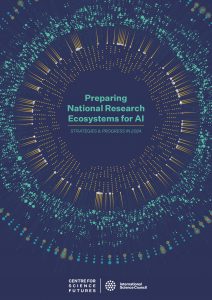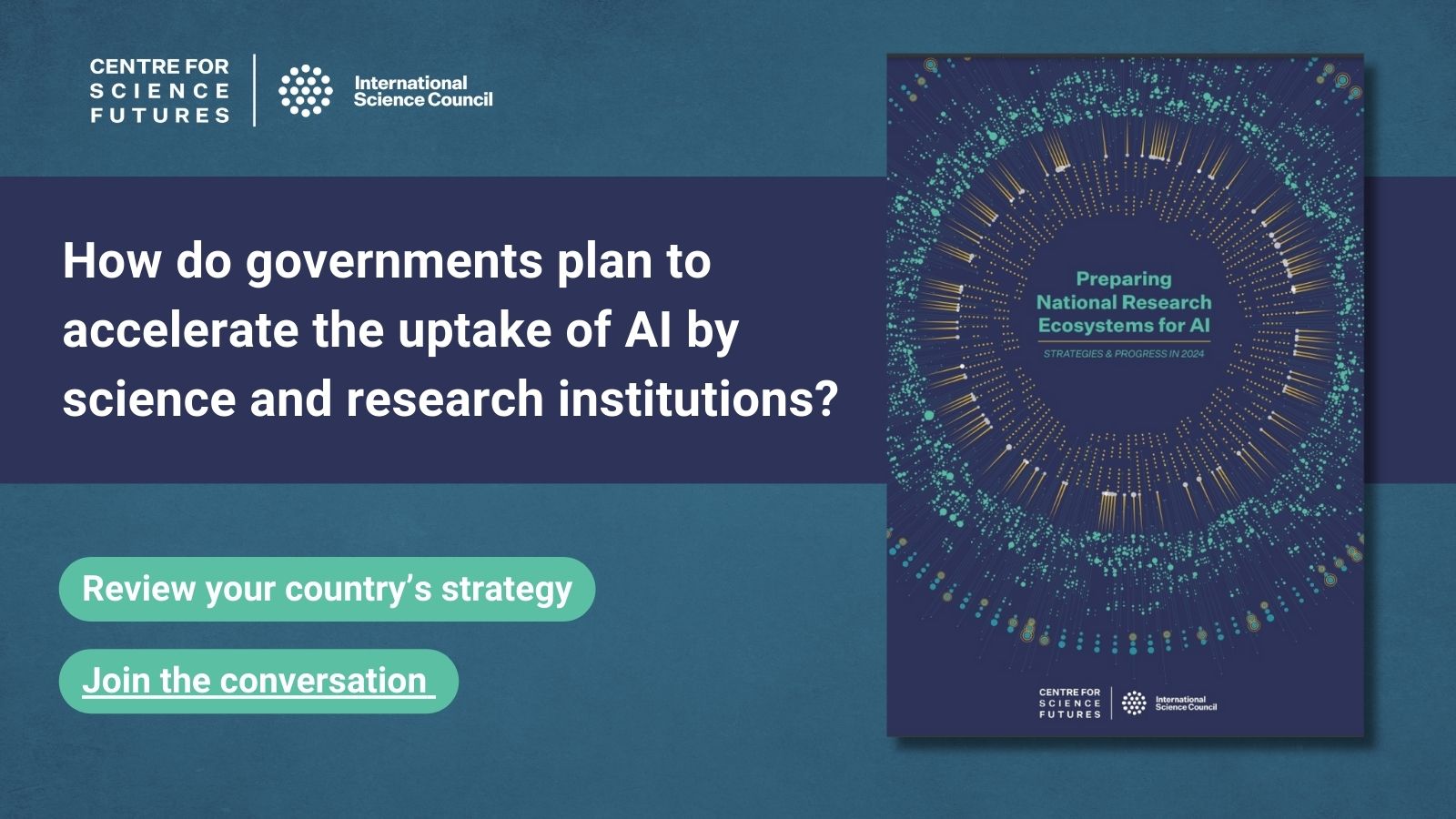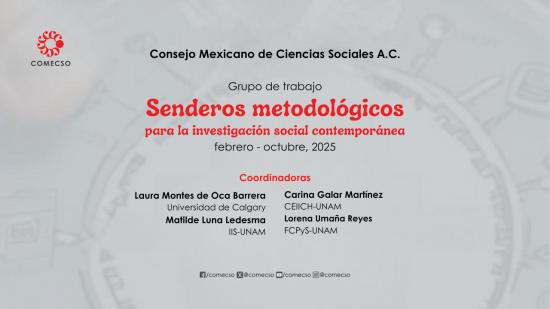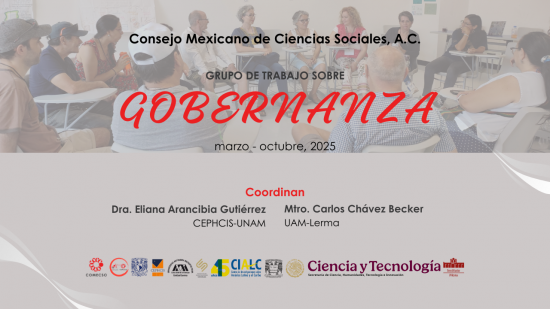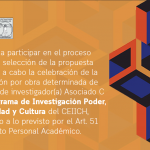Preparing National Research Ecosystems for AI
Center for Science Futures, International Science Council
National Research Ecosystems for AI: Strategies & Progress in 2024
Introduction
The dominant notion communicated today on the influence of artificial intelligence (AI) is its capacity to change everything across all sectors, including science (Khalif et al., 2023; Nature, 2023; Van Noorden and Perkel, 2023; Miller, 2024). Beyond the promises of new advances in different fields of research, a set of critical questions is emerging about the impact of AI on the documentation, funding and reporting of science:
- How is the increasing use of AI going to influence research funding allocation?
- What research data standards will evolve? How will AI change the nature of scientific outputs?
- How will scientific careers evolve with the increasing use of AI in research?
- What investments in infrastructures are required for the successful uptake of AI by the science sector?
- What legal adjustments are needed to enable the use of AI in research while ensuring high standards in the responsible conduct of science?
- How is AI going to affect international research collaborations?
Discussions around these questions are critical for the future of science and research systems. Research institutions and ministries are beginning to tackle them, although with limited resources to guide them. As this study will show, there remains a notable absence of comprehensive literature regarding the impact of AI on the structural aspects of science and research.
Several countries have developed overall AI strategies to set out their plans and aspirations for AI development and implementation across different sectors. Despite the immediate and significant implications of these strategies for science and research, these documents mostly offer broad statements on the involvement of science and research institutions in delivering the national plans without looking further into the concrete implications.
This is not to suggest that countries are inactive. Quite the opposite: much is under way. Partnerships are being formed, training initiatives launched, infrastructures put in place and policies implemented. However, people in governmental ministries, universities and
consultancy firms tasked with spearheading the preparation of the research environment for AI are largely working with speculation on the key challenges and have limited insight into the approaches being adopted by countries of similar size and capacity.
Frameworks outlining the key issues for countries to consider when planning the integration of AI into their research ecosystems can come a long way at this critical stage. This working paper offers one such framework derived from an analysis of the existing literature.
To start establishing a knowledge baseline, the paper also presents 12 case studies from countries of different sizes and regions, authored by people directly engaged in these discussions in their respective countries. We intend to expand the number of case studies and achieve a more comprehensive representation of the different global regions in the upcoming and final edition of the paper by the end of 2024.
It is important to consider the circumstances of countries of varying sizes, which are also major contributors to scientific advancements, rather than solely focusing on the AI powerhouses. We deliberately sought to gain insight into how small to medium-sized countries are preparing their research ecosystems for the uptake of AI.
This working paper therefore seeks to:
- gather the basic knowledge and information about the issues, and the current efforts to prepare science and research systems for AI;
- help countries as they develop roadmaps for the uptake of AI in their science systems;
- create regional and global networks of people involved in the reflections on adaptation and implementation of AI for science;
- raise awareness and help shape a critical discussion among the scientific and policy communities of the critical issues that AI raises for the organization of science and research.
The development of the working paper benefitted from a workshop convened in October 2023 in Kuala Lumpur, Malaysia, bringing together participants from 12 countries in Asia and the Pacific. Contributions from some countries who participated in the workshop have been incorporated into version 1 of the paper. The coordination of the workshop was generously supported by the Australian Academy of Science and the Malaysian Academy of Sciences.
The publication of this paper will be followed by similar regional workshops and consultations. A second version of the paper will be released later in the year featuring additional country case studies and a set of conclusions and recommendations.
Download the report>>
References
Khalif, Z. N., Mousa, A., Hattab, M. K., Itmazi, J., Hassan, A. A., Sanmugam, M. and Ayyoub, A. 2023. ‘The potential and concerns of using AI in scientific research: ChatGPT performance evaluation’. JMIR Med. Educ., Vol. 9, pp. e47049. https://doi.org/10.2196/47049.
Miller, A. 2024. ‘The top arguments against artificial intelligence in science’. ReHack, 19 January. https://rehack.com/ai/arguments-against-artificial-intelligence/.
Nature. 2023. ‘AI will transform science – now researchers must tame it’. Nature, No. 621, pp. 658. https://doi.org/10.1038/d41586-023-02988-6.
Van Noorden, R. and Perkel, J.M. 2023. ‘AI and science: what 1,600 researchers think’.
Nature, No. 621, pp. 672–675. https://doi.org/10.1038/d41586-023-02980-0.
Te puede interesar

Publicaciones del COMECSO
Roberto Holguín Carrillo - Ene 08, 2025Este espacio reúne la gran mayoría de la producción editorial de nuestra asociación. A lo largo de casi cinco décadas,…

Los ideales democráticos frente al nacionalismo hindú
Laura Gutiérrez - Mar 31, 2025Universidad Nacional Autónoma de México, Centro Regional de Investigaciones Multidisciplinarias Seminario Religiosidades e identidades en contextos geopolíticos globales – sesión…
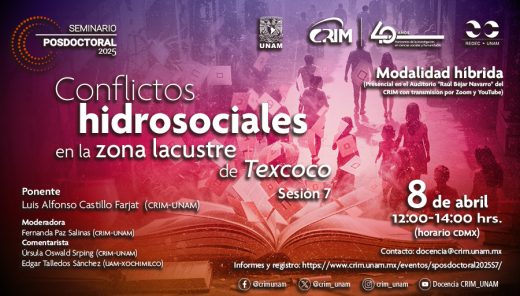
Conflictos hidro sociales en la zona lacustre de Texcoco
Laura Gutiérrez - Mar 31, 2025Universidad Nacional Autónoma de México, Centro Regional de Investigaciones Multidisciplinarias Seminario Posdoctoral 2025 – Sesión 7 Objetivo del Seminario: Presentar…
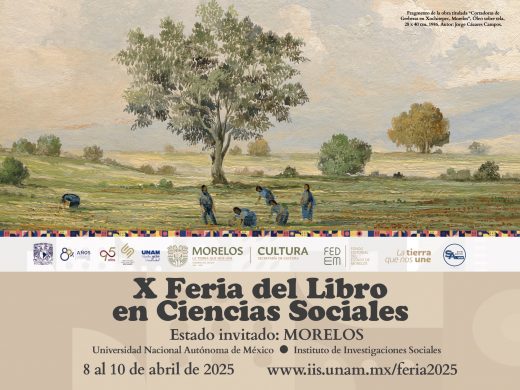
X Feria del Libro en Ciencias Sociales
Laura Gutiérrez - Mar 28, 2025Universidad Nacional Autónoma de México, Instituto de Investigaciones Sociales X Feria del Libro en Ciencias Sociales 8, 9 y 10…

